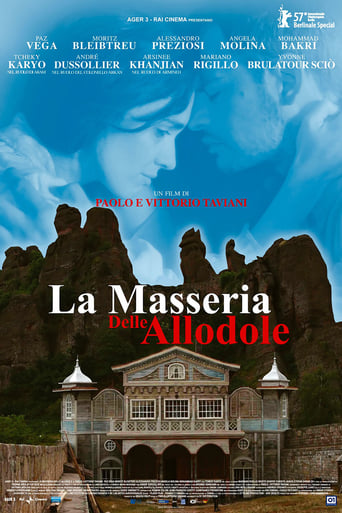meriko
Considering the difficult subject, the directors are masterfully telling the story of the fate of the Armenians in the Ottoman Empire during WWI. This is the first film of it's kind, and as a descendant of Genocide survivors, it was the film I always hoped to see.The film was wonderful at finding the visual beauty that could transform the horrific events of the Armenian Genocide into a universally relatable story. Without omitting the cruelty and atrocities that Armenians so painfully recognize from the stories of our parents and grandparent, the film focuses on the humane more than the inhumane, the beauty rather than the ugliness of humankind without being unrealistic or contrived.I enjoyed the costumes, the sets, the cinematography, and (most of )the acting. My respects to the film-makers and actors for having the courage to approach this subject, and succeeding at making a historically accurate film, that was also full of emotion and human drama. Bravi!
snkojoian
I LOVED the book, but didn't care for the movie at all. It was sitting on my TV for 5 weeks before I had the courage to watch it, and I was very disappointed. I just don't think it truly conveys the horror of the book or what actually happened 90+ years ago. Having read book after book, both fiction and non-fiction, about the Armenian Genocide I hoped for, and expected, a better movie. The acting was awkward, the cinematography was lacking and so much of the book was left out or changed that I doubt I would have been able to keep track of who was who or what was going on if I hadn't read the book (and I read it some 4 years ago.) Having said this, I still think it is worth seeing, if for no other reason than to support a film that no American distributor is willing to touch, and no American filmmaker or studio has the guts to make. See the movie, then PLEASE, PLEASE read the book!
altyn
It started in an uncertain way, with too many obvious passages and with characters showing at once what we should expect of them. Yet a surprise was in the making. The first part seemed a déjà vu exercise and might have been shot about anything else - I feel I have seen exactly the same plot in some TV film on the Jewish Holocaust. Then the killing began and the whole world was changed. The realm of the obvious became the realm of terror. Villains and heroes change places. Some clues take a long time to unveil, and this is good. The realm of horror is the right background of an epic tale of suffering and resistance. Here, hallucinations and dreams are the food of the mind and of the empty body. Reality is cruel and crude and mind-torturing and in this pitch of darkness we are really surprised to witness a few really human beings. The epic resistance of Nonik and the unexpected accusation of Yussuf make for a great tale on a few remains of humanity.
victvic
I just returned from the screening of the movie at the Berlinale. I am really impressed and it is really hard to find words to describe my emotions. Probably I'll go to watch it once again tomorrow. But I should say that "La Masseria delle allodole" is the movie that makes you not only think, but also speak and even cry. Think about life, death, love, friendship, human cruelty and speak about history. Like Tavianis have spoken about it. No, I am too emotional. OK, just watch it. And I think you'll feel the same, or may be different, but YOU FEEL. After the presentation one of the actors sad, that he had seen a lot of people crying during the screening. "Crying is not enough, we have to speak" he sad. Speak about Armenian Genoside, Darfour and other tragedies, which some used to keep their mouths closed, or even deny.


